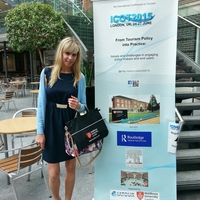
Francisco Dias
Hello! My full name is Francisco Teixeira Pinto Dias. I’m Associate professor at the Polytechnic Institute of Leiria, School of Tourism and Maritime Technology, Portugal. I’m Director of the ART
Phone: +351-968054342
Address: School of Tourism and Maritime Technology
Santuário N. Sra. dos Remédios
Peniche - Portugal
Phone: +351-968054342
Address: School of Tourism and Maritime Technology
Santuário N. Sra. dos Remédios
Peniche - Portugal
less
Related Authors
Noel B. Salazar
KU Leuven
C. Michael Hall
University of Canterbury/Te Whare Wānanga o Waitaha
Zelia Breda
University of Aveiro
Nicola Jane Holt
University of the West of England
Professor Dimitrios Buhalis
Bournemouth University
Emese Panyik
Universidade Católica Portuguesa
Dr. Miguel Moital
Bournemouth University
Cristina Jönsson
University of the West Indies- Cave Hill (Barbados)
Steffen Boehm
University of Exeter
Raquel Huete
University of Alicante / Universidad de Alicante
InterestsView All (23)









Uploads
Papers by Francisco Dias
impressions in large audiences. Concomitantly, as people are steeped in sensory information about tourist destinations, it is important to understand how those stimuli act in the potential tourists' minds. The present study aims to analyse the contents of tourist imagery related to two highly desirable but contrasting destination categories: Dream destinations and Favourite destinations. The former category refers the places that one never visited but desires to visit in the future; while the later concerns those locations one already visited and liked the most and, hence, deserve to be recommended. Adopting the grounded theory approach, an online multilingual survey was carried out at worldwide level. The empirical material consisted of a mega-data comprising 23,446 responses that correspond to 70,338 words spontaneously associated by respondents to their Dream and Favourite destinations. The data analysis, performed with the software QSR NVivo 11 pro, was based on the Echtner and Ritchie’s (1991) framework, and included the following a hierarchy of nodes: psychological holistic, functional holistic, psychological attributes, functional attributes and unique. Results reinforce the most recent theories about the structure of destination imagery, as well as show clear structural differences between the imagery of Dream destinations and of Favourite destinations. Additionally, a theoretical model that offers a basis for future studies was proposed, and some managerial implications of significant relevance to destination marketing were discussed.
impressions in large audiences. Concomitantly, as people are steeped in sensory information about tourist destinations, it is important to understand how those stimuli act in the potential tourists' minds. The present study aims to analyse the contents of tourist imagery related to two highly desirable but contrasting destination categories: Dream destinations and Favourite destinations. The former category refers the places that one never visited but desires to visit in the future; while the later concerns those locations one already visited and liked the most and, hence, deserve to be recommended. Adopting the grounded theory approach, an online multilingual survey was carried out at worldwide level. The empirical material consisted of a mega-data comprising 23,446 responses that correspond to 70,338 words spontaneously associated by respondents to their Dream and Favourite destinations. The data analysis, performed with the software QSR NVivo 11 pro, was based on the Echtner and Ritchie’s (1991) framework, and included the following a hierarchy of nodes: psychological holistic, functional holistic, psychological attributes, functional attributes and unique. Results reinforce the most recent theories about the structure of destination imagery, as well as show clear structural differences between the imagery of Dream destinations and of Favourite destinations. Additionally, a theoretical model that offers a basis for future studies was proposed, and some managerial implications of significant relevance to destination marketing were discussed.
Editor's note
Francisco Dias and Sofia Eurico
Innovation in nature-based tourism: The case of marine tourism in northern Norway
Heidi Holmgren
Authenticity and eco-cultural tourism development in Kazakhstan: A country branding approach
Guillaume Tiberghien, Vladimir Garkavenko
Customers´ post-implementation attitudes towards café smoking ban in a transition country
Ljudevit Pranic, Snjezana Pivac
Online social networks impact on potencial travellers´tourism and hospitality choices
Masooma Al-Balushi, Tamer Mohamed Atef
Social media and destination positioning: Egypt as a case study
Suzan Bakri Hassan
Out-of-country training for hotel middle managers in Jordan: Selection criteria and implications
Mousa Masadeh
Ports of call: In search of competitive advantage
Graham Busby, Jennifer O´neill
Editor's note
Francisco Dias
ARTICLES
Detection of high impact tourist events in Piemonte region, Italy
Roberto Fontana, Giovanni Pistone
The economic effects of taxing tourist accommodation
Beatriz Lacomba Arias, José Benítez-Rochel
Investigating transactional philanthropy in the hospitality industry: An Exploratory Study Studying “Hotels that Help” Guest Donation Program
Colin Johnson, Mehmet Ergul, Miriam Scaglione
Exploring business opportunities in marine affairs: A feasibility study for submersible research tourism
Alex W. Adams
High cuisine restaurants: Empirical evidences from a research in Italy
Angelo Presenza, Simone Iocca
The importance of celebrity association in tourism destination branding: Determining the power of the JFK brand in New Ross (County Wexford, Ireland)
Noëlle O’Connor, Sinéad O’Leary
Souvenirs and territorial representations: A case study in Santiago de Compostela
David Santomil Mosquera, Rubén Camilo Lois González
RESEARCH PAPER
Social entrepreneurship: A Hospitality and Tourism Perspective
Mehmet Ergul, Colin Johnson, Denise Kleinrichert
BOOK REVIEW
Tourist experience: Contemporary perspectives edited by Richard Sharpley and Philip R. Stone
Alfonso Vargas-Sánchez
"
Editor's note
Francisco Dias, Sofia Eurico
Tourism destination image of post-revolution Egypt as perceived by UK-based travel intermediaries
Galal Afifi
Second home tourism in the oeste region, Portugal: features and impacts
Maria de Nazaré Oliveira Roca, José Oliveira, Zoran Roca, Luís Costa
Measuring factors that influence a visit with a movie map: an empirical analysis of a surrealist cult film
Angel Millan, Juan A. Garcia, Estrella Diaz
A model of integrated beach resort development: sustainability and the role of corporate social responsibility
Russell Arthur Smith
Visitors to the city of Évora: who are they?
Noémi Marujo, Jaime Manuel Serra, Maria do Rosário Borges
Territorial management of italian catholic church: between pilgrimages and religious culture
Fiorella Dallari
Editor's note - From Science to the Market, via Ethics
Francisco Dias
A quantitative approach of the tourism area life cycle
Júlio Coelho, Richard Butler
Tourist’s satisfaction, image or emotions?
Manuel Rey-Moreno, Cayetano Medina-Molina, Ramón Rufín-Moreno
The effects of implementing “Q for Quality” on the business performance
José Álvarez García, José A. Fraiz Brea, María del Río Rama
Education and ecotourism: A framework and analysis of education in ecolodges in Costa Rica and Panama
Gregory E. Osland, Robert Mackoy
Issues on tourism and marine resources’ employability: A challenge for higher education?
Sofia Eurico, Fernanda Oliveira, Sílvia C. Gonçalves, Sónia Pais
Postcards: A geographic approach of the diffusion of the landscapes in the territories
Jean-Baptiste Litot, Jean-Christophe Foltête
Wine-blogs influence and blogs’ community connectivity: a social network analysis
Kostas Zafiropoulos
Diversification as a livelihood strategy in a touristic place of nepal
Suman Pandit
Editor's note
Francisco Dias, Paulo Alcobia, Sofia Eurico
Examing the formation of attitudinal, conative and behavioural loyalty: An empirical analysis in the hotel industry
Dwi Suhartanto, Michael Clemes, David Dean, Anthony Brien
Competitive choice dimensions of golf destinations: A multivariate perceptual mapping analysis
João Paulo Jorge, Carlos Monteiro
Online content mining technologies for the cruise industry: State-of-the-art and acceptance
Karsten Sohns,Michael H. Breitner, Alexix Papathanassis
One flew over the brands' nest: Rethinking destination brand concept
Francisco Dias, Isabel Andrés Marques
A conceptual examination of the film induced tourism phenomenon in Ireland
Noëlle O'Connor
Physiologically equivalent temperature as a factor for tourism in extreme climate regions in the Russian far east: Preliminary results
Elena Grigorieva, Andreas Matzarakis
Science and tourism education: National observatory for tourism education
Manuel Salgado, Carlos Costa
Editor's note
Francisco Dias, Paulo Alcobia, Sofia Eurico
Socioeconomic development in rural areas through the creation of tourist routes: An olive tourism approach in the Jaén province (Spain)
Tomás López-Guzmán,Virgilio González-Fernández
Seasonal changes on resort patronage in cross river State – Nigeria
Eja Eja, Anim Ajake, Violet Effiom, Bernadette Ndomah
Everest tourism: Forging links to sustainable mountain development. A critical discourse on politics of places and peoples
Sundar Kumar Sharma, Prabin Manandhar, Sarba Raj Khadka
Expectations and perceived quality of customer service:The model of expectations management of the quality of health and wellness tourism destination
Filipa Carvalho
Image and positioning of the European tourism market from the perspective of spanish tourists
Sérgio Lopes, José Silva
Reciprocity, hospitality and tourism: An examination of Marshal Sahlins’s contributions
Maximiliano Korstanje
The importance of the consumption of semiotic signs for the competitiveness of the tourist destinations
Fernando Santos, Ana Marques
Fiction series as strategic component of the leisure and entertainment industry
José Antonio Fraiz, Noelia Araújo Vila, Lorena Rodríguez Campo
Editor's note
Francisco Dias, Paulo Alcobia
In memoriam
Francisco Dias, Maria Isabel Marques, Philippe Bachimon
Islandness and remoteness as resources: Evidence from the tourism performance of small remote island economies
Shamnaaz Sufrauj
Effects of climate change on Romanian mountain tourism: Are they positive or mostly negative?
Camelia Surugiu, Marius-Razvan Surugiu, Cristi Frent, Zélia Breda
The impact of secondary information sources on the formation of the tourist image: The case of rural tourism in Galicia
María José Andrade Suárez
Travel experience ecosystem model: Building travel agencies' business resilience in Portugal
Josefina Salvado
Benchmarking of tourism products and implementation in Galicia
Belén Castro, Montserrat Iglesias, Maria José Piñeira, Valerià Paül
Tourist destination image formed by the cinema: Barcelona positioning analysis through the feature film Vicky, Cristina, Barcelona
Lorena Rodríguez, José Antonio Fraiz, Diego Rodríguez-Toubes
Rural tourism associated with agriculture as an economic alternative for the farmers
Luísa Calado, Ana Rodrigues, Paulo Silveira, Tomaz Dentinho
Preface
Nuno Mangas
EJTHR - an international journal devoted to research in Tourism
Francisco Dias, Paulo Alcobia, João Vasconcelos, Anabela Almeida
Sustainability or stagnation? Limits on development in tourist destinations
Richard Butler
An institutional approach to the environmental management systems of golf courses in Andalusia
Alfonso Vargas-Sánchez, Francisco Riquel-Ligero
The inter-community competition as a factor for sustainability and differentiation of tourism product
António Araújo Almeida
Creating local experiences of cultural tourism through sustainable festivals
Razaq Raj, Claudio Vignali
Tourism destination branding and its effects on national branding strategies: Brand New Sealand, clean and green but is it smart?
Michael Hall
Destination image: Perspectives of tourists versus residents
Dora Agapito, Júlio da Costa Mendes, Patrícia Oom do Valle
Management accounting practices in the Portuguese lodging industry
Luís Lima Santos, Conceição Gomes, Nuno Aroteia
Chaotic changes in distribution channels: Implications for hospitality companies
Dogan Gursoy